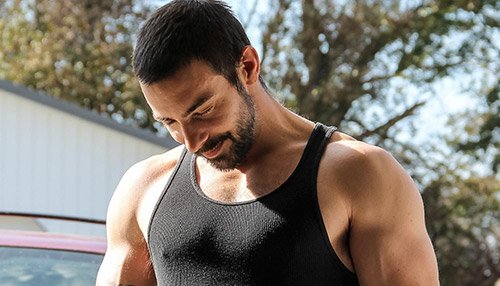
Andrew Overcame Crohn's Disease and Got Fit!
Andrew Chilson didn't let the hurdle of Crohn's disease sideline his health. He learned to control his diet, bounced back into fitness, and got in the best shape of his life.
Andrew Chilson's weight-loss journey started with food, but he didn't just swap burgers for salads or sugary drinks for more water. Instead, Andrew had to learn how to retool his entire diet to overcome his major hurdle: Crohn's disease. "Crohn's covers your entire gastrointestinal track—from the esophagus down into your colon," he says. "I ended up with bleeding ulcers, so I couldn't digest food properly."
Unfortunately, poor nutrient absorption and a lack of energy were just the start of Andrew's weight gain. As if the effects of Crohn's weren't bad enough, the meds made things worse. Five years after being diagnosed with Crohn's, Andrew had gained over 100 pounds and watched his body fat balloon up to 33 percent.
Andrew had several reasons to change, but in the end, aesthetics alone weren't enough to get Andrew to commit to a fit lifestyle—his family was. "It was difficult just to play outside with my kids," he says. "Being told by my doctor that I couldn't do anything active except walking really pushed me to make a change."
This is Andrew's story.
How did you first find out you had Crohn's disease?
I noticed one day that I had a little bit of blood in my stool and was feeling more drained, but I pushed through and paid little attention to it. Only when it got to the point where everything was challenging for me did I finally go to the doctor. That's when I was diagnosed. I'd already started feeling the effects, but at first, it was a slow process. Once the prognosis was official, it seemed to progress faster. I think a lot of that was mental.
Crohn's disease has played a major role in your life. How did it directly impact you?
There was a period of time when I wasn't able to do anything. I was just too weak. My body just started dumping out the food I was eating instead of absorbing it. I had no energy and lost a lot of blood, which caused me to pass out multiple times. My weight dropped from 160 to 130 pounds. Crohn's killed my energy and left me in intense pain.
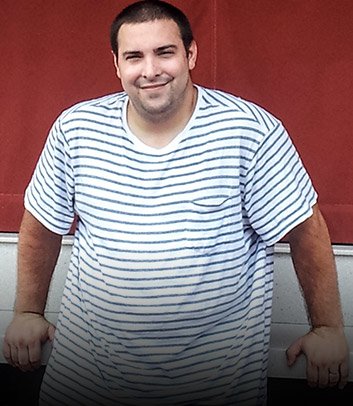
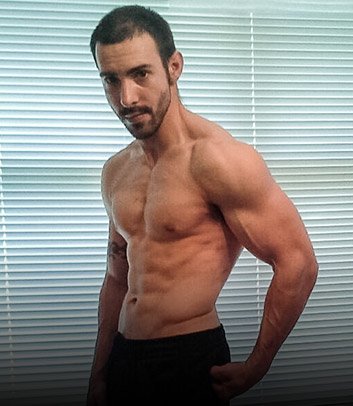
Height: 5'7"
Weight: 238 lbs.
Body Fat: 33%
Height: 5'7"
Weight: 158 lbs.
Body Fat: 5.5%
Since you weren't digesting food and were losing weight, how did your weight gain begin?
To treat Crohn's disease, I was put on prednisone, a steroid that caused me to gain weight like crazy. I would try to eat decently healthy, but I'd usually eat a full dinner of two or three hamburgers and fries. That wouldn't have been bad, except that 30 minutes later I'd feel like I hadn't eaten all day and be hungry again.
One of your transformation tipping points seemed to come from a doctor's doubts. Tell me about that. The doctor didn't want me to start working out again—he told me my body couldn't handle the stress. That was hard to hear because I played baseball all through grade school and high school, and I grew up doing a little boxing.
I trained in MMA and was even a sponsored skateboarder up until my Crohn's diagnosis. Needless to say, I hated the idea of not being able to do anything. I'd always been athletic, so just hearing that I couldn't be made me mad.
What was your mental state during that time?
I was in a dark place. The news had me pretty depressed. More than anything, it was the frustration of not being able to do things with my kids. At the time, my daughter was not quite yet two and my son was about five. I was diagnosed before they were born, so they didn't know me during my typical, active days.
I remember coaching my son's pitching team, and even just standing there and throwing a ball left me winded. I felt miserable. It was like everything hit me at once, and I finally had enough of it.
What happened once you decided to take action?
It wasn't until I got fed up dealing with things that I saw a nutritionist who revamped my meal plan. She stripped my meals down to find out what I could digest. There was a time when all I was eating was baked chicken. There was no variety at all. I could put it in soup, but broth and bird were it.
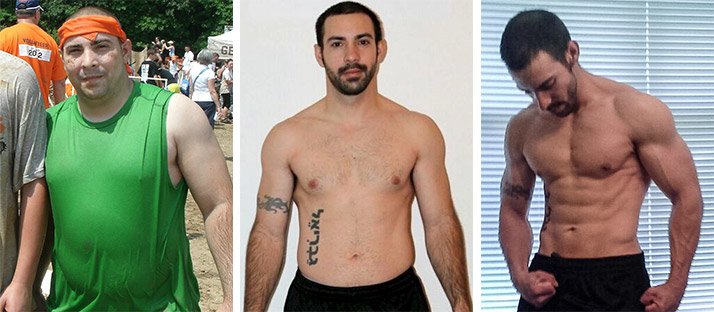
Even some healthy foods were off-limits for a while. Dairy products didn't sit well, especially in large amounts. Sometimes, it just came down to the preparation. Raw fruits and vegetables would kill my stomach. Cooked veggies were OK, but without that added heat, digestion was rough.
Each week, something else would be added to my diet. If things didn't work, or were just too taxing on my system, we'd re-evaluate.
How has your diet progressed since?
Right now I'm following a 40/40/20 split, meaning that 40 percent of my diet is comprised of carbs, 40 percent is protein, and 20 percent is healthy fats. I change it a bit based on how I'm feeling, but the good news is that I haven't had to be on any medication for about two years or see my nutritionist in a year.
My diet's also way more varied. I track my meals and have come to realize that as long as I'm paying attention to how I'm feeling, I never have a full flare-up.
Do you allow yourself the occasional cheat meal?
I still allow myself to cheat once a week, but I keep it in moderation. I don't completely cut stuff out because then I'll start craving it, and that kills me. I'm a huge fan of cheesecake, but only allow myself to eat it once a month.
Did your training undergo the same evolution?
I'd weight trained in high school and lifted constantly when I did MMA prior to my diagnosis, so I was familiar with the gym. At first, I used Bodybuilding.com to build my own program with the exercises I knew I could do and the equipment I had available.
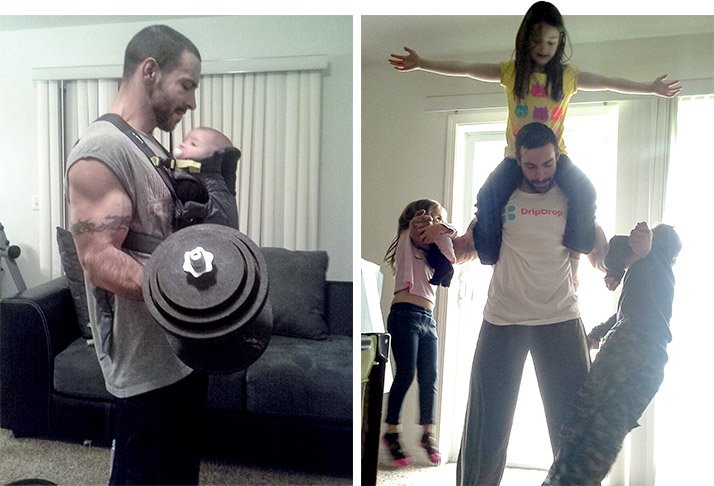
You had a strong fitness background, but did you face any hurdles when you started rebuilding it?
The first month was pretty miserable because I kept getting sick. I guess a normal, sane person would probably have stopped at that point, but I couldn't. Even though I felt miserable at times, I was still having fun working out. It's strange, but working out was probably the only thing I was doing at that time that made me feel alive. I might have been lacking energy and motivation at first, but I knew I would finish a workout feeling mentally recharged.
Did you follow a specific program?
After following my own program and getting used to working out again, I followed "Kris Gethin's 12-Week Muscle-Building Trainer" and "Jim Stoppani's Shortcut to Shred." Both were rough, but I loved them. Whenever I push myself really hard at the end of a workout, I get this crazy euphoric feeling.
When did you start seeing physical changes?
About two months in, I started getting stronger, which was huge for me. There was a time when getting 135 on the bar was a struggle. It blew my mind, but I had no strength. In fact, my biggest goal was being able to bench and squat my body weight. From there, I increased the load by five pounds each time. As soon as I did that, I began losing weight. Now I'm in way better shape than I ever was.
I heard you've started helping people via social media. Can you tell me about that?
I've met people on Twitter and Facebook who have ulcerative colitis or Crohn's disease and are trying to get back in shape. The effects of the medicine can make you really balloon up. I've just been showing them what I did and helping them tweak their diets a little at a time, though I always recommend that they see a nutritionist.
Do you share your workout programs with them?
Yes. I usually show them what I started out doing, which was very light training. I give them lifting advice based on what I've learned. Initially I was all about higher reps and lower weight, just because it would strain my whole body to lift something heavy and really push on my stomach, which is where I had pain.
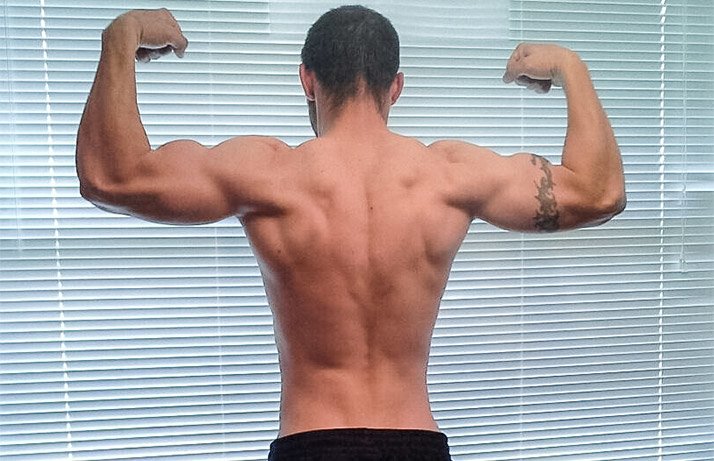
What are your future plans?
I have a lot of work to do, but I want to compete in a physique competition. I love the way physique competitors look, and I've always loved competing. There's no way I'll ever be big enough for bodybuilding.
Do you have any last bit of advice for someone just starting their journey?
The biggest thing is to listen to your body. If you're paying attention, it pretty much tells you everything you need to know. And remember, you are capable of so much more than you think.

